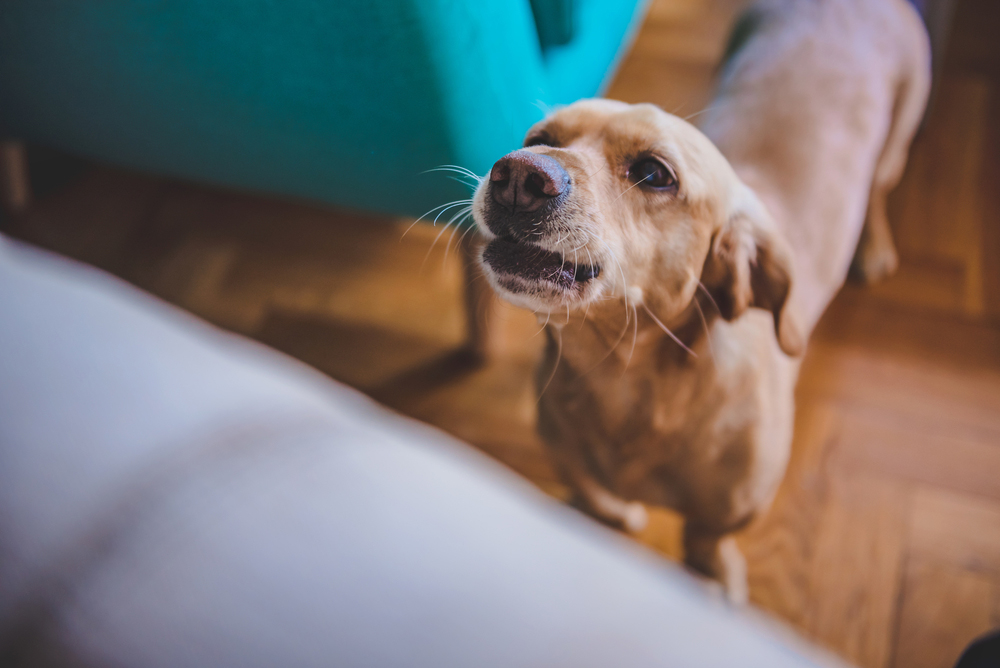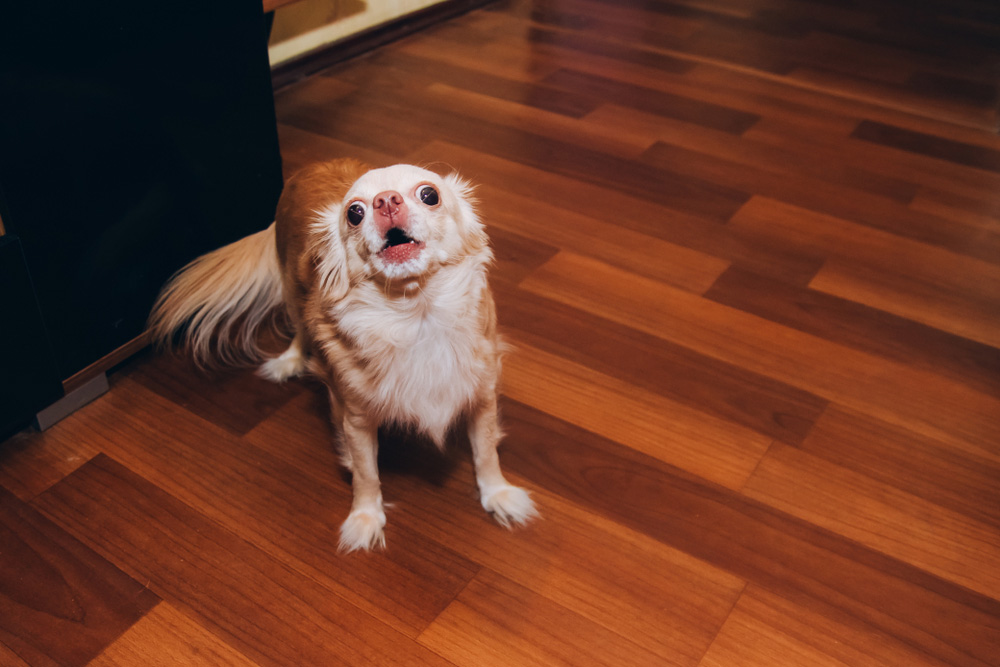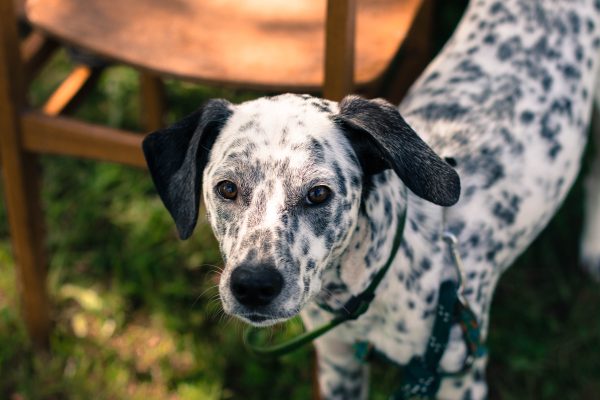In this article
View 3 More +Barking is perfectly normal for nearly any dog, but unexplained changes to their behavior can be rightfully concerning for owners. Shifts in mood and increased vocalizations often indicate an underlying health problem needing attention. For many senior dogs, these issues are an expected effect of their bodily decline.
If you’ve noticed your dog being louder than usual in the evening, slow and, sometimes distressing, changes to their bodies are likely to blame. We’ll discuss why your senior dog barks at night and provide tips for helping them relax.

The 3 Possible Reasons Your Senior Dog Is Barking at Night All of a Sudden
Despite their propensity for barking, dogs rarely do it as a recreational activity. They bark to grab attention, show excitement, or react to stress resulting from uncertainty, perceived threats, or discomfort.
As dogs age, their weakening bodies can affect their senses and brain function, making them more susceptible to anxious barking. Among other signs of physical changes, dogs often increase their barking at night, potentially creating conflict with others in the home.

1. Pain
Physical discomfort can reveal itself through various signs of irritability, including barking at night. Many senior dogs develop chronic pain from osteoarthritis. The progressive disease affects up to 80% of dogs over 8 years old.
- Stiffness or limping
- Lethargy and reluctance to exercise
- Weight gain
- Obvious pain when touched
- Difficulty getting up and down
- Restlessness
- Increased elimination indoors
Maintaining a healthy body condition will reduce the risk of arthritis in dogs, and weight loss can also improve their mobility if they are obese.1 Joint supplements, speciality diets, arthritis injections, and other pain relief medication may also be part of their treatment plan from the vet.
Your dog may also be in pain from other medical conditions like cancer or periodontal disease, so a thorough check up is a must when a senior dog is barking excessively at night.
2. Declining Vision or Hearing
Dogs typically experience some sensory decline as they age. Vision loss may occur from age-related illnesses like cataracts, which could lead to signs like:
- Cloudy eyes
- Bumping into walls and furniture
- Getting disorientated with changes in the house
Likewise, older dogs can develop hearing problems in one or both ears.
- Startling easily
- Ignoring commands and sounds
- Barking loudly
Dogs can adapt well to vision and hearing loss, if there are no changes in the environment. You will have to make some allowances for them though. They will need to be kept on leash when out for walks. For dogs that can’t hear well, sign language can help you communicate with them. For those with impaired vision, to keep them safe you should fence off stairs and other dangerous areas around the house.
Consistent routines and sensory aids around the home can help dogs adjust to vision and hearing loss and reduce related stress behaviors. Problems like barking at night can occur as they struggle to make sense of their surroundings.
3. Cognitive Dysfunction
Canine cognitive dysfunction syndrome (CCDS) is one of the most common causes of increased barking at night. The disease is similar to Alzheimer’s in humans. Several issues can contribute to cognitive decline as dogs age, including:
- Amyloid beta accumulation in the brain
- Oxidative stress
- Cerebrovascular disease
- Neuronal loss
Research has shown varying rates of CCDS ranging from 14% to over 60%, with occurrences increasing as dogs get older. One study found over two-thirds of dogs at 15-16 years old displayed at least one sign of CCDS.2


Signs of Cognitive Dysfunction in Dogs
Many owners overlook cognitive dysfunction signs and think the changes in behavior are a normal part of aging. The DISHAA acronym can help owners identify the issue so they can start working with their vet to slow the disease’s progression:
- Disorientation: Dogs may forget which door to exit to leave the house, stare into space, get stuck behind objects or lost in the yard, or forget familiar people.
- Interactions: Dogs show more fearful, irritable, or aggressive behaviors toward others and decreased interest in social engagement.
- Sleep/wake cycles: Dogs sleep more during the day, pace and stay restless at night, and often bark more after sundown.
- House soiling: Dogs eliminate more often indoors and indicate a need to go out less often.
- Activity: Dogs do less exploring and playing with friends and family, increase their pacing and wandering, and engage in more repetitive behaviors.
- Anxiety: Dogs show more separation anxiety, reactive and fearful responses to sights and sounds, and stress in different places.
Dogs with CCDS show clear signs of memory loss and learning difficulty. They may have more trouble learning new tasks or become inattentive to commands. Focus is challenging, and you’ll find your dog becoming easier to distract during training and everyday interactions.

Treatment for CCDS
CCDS is not curable, but owners can consider several modes of treatment to slow its progression.
- Prescriptions (e.g., selegiline hydrochloride, nicergoline, and propentofylline): Medications that improve brain activity, blood flow, and chemical transmission.
- Senior diets: Antioxidant-rich foods for older dogs can slow free radical brain damage.
- Supplements: Over-the-counter supplements like medium chain triglycerides, omega-3 fatty acids, L-tryptophan, and GABA, to improve brain function and relax your dog.
At-home enrichment supports diets and medications to improve a dog’s quality of life when they suffer from CCDS. Owners can help their dogs increase their focus by engaging them with mentally stimulating puzzle toys or playing more games that exercise their instincts, like fetch. Walking in new environments and taking walks before bedtime can also help them learn to relax at night.


How to Reduce Night-Time Barking
If you can’t determine the stimuli that might have your dog riled up, talk to your vet about your dog’s new night-time barking habits. You can monitor your dog’s behavior for additional signs of underlying health issues.
With your feedback, your vet can perform appropriate testing and prescribe a custom treatment plan to help your dog regain independence and confidence. In many cases, they can prescribe medications to calm them and help them sleep at night, or pain relief medication to make them more comfortable.
If you need to speak with a vet but can't get to one, head over to PangoVet. It's an online service where you can talk to a vet online and get the personalized advice you need for your pet — all at an affordable price!

Control Night-Time Stimuli
Eliminate any potentially irritating stimuli that you can to help your dog stay relaxed at night. Close the curtains and turn off noisy appliances that randomly kick on and off. Keep your dog in a quiet area of the house. White noise or classical music may also help dogs enjoy a more relaxing sleep and cover other noisy stimuli that might alert them otherwise.
Make Their Sleeping Space More Comfortable
An aching senior dog will have more difficulty getting a good night’s sleep. Consider your dog’s current arrangement and how you can upgrade it. Maybe they need a bigger crate, a softer mattress, or a spot in your bedroom. With a more comfortable, secure bed, your dog should have an easier time going to sleep and staying asleep.
Try Calming Aids
Supplements are a convenient way to help dogs relax at night and quell their anxious barking. L-tryptophan supplements are calming, and available over the counter. You can also try calming pheromone sprays and diffusers to reduce stress and fear at bedtime.


Conclusion
Are you noticing behavioral changes in your dog? Night-time barking is one of many effects of aging related to declining health and requires close attention. Finding ways to treat and relax your dog at night can profoundly impact your dog’s quality of life, and your family and neighbors will undoubtedly appreciate the effort.
Featured Image Credit: Dubin Mykhailo, Shutterstock



















